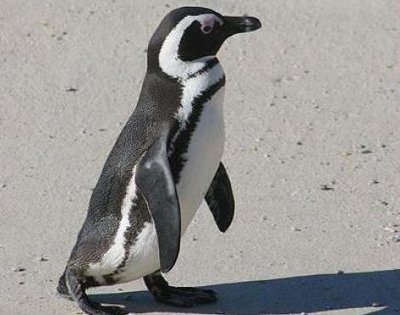African Penguin
Category: Penguin

Facts about African Penguins. "Scientific name for African penguin is Spheniscus demersus". The African Penguin is approximated to have a population of about 70,000 breeding pairs globally. The African Penguin is the only penguin that is scene regularly in southern tip of Africa and in Namibia. Other names the African Penguin is called by is jackass penguin and the black-footed penguin, as the penguins call sounds similar to a donkey braying.
Features of the African Penguin
The African penguin has a black upper body and a white lower body, with a distinct black chin. It has a broad white band separating the face patch. A narrow black band cuts across its chest and runs all the way down its flanks to the legs. African Penguins length is about 27 inches (68cm) with male African Penguins weighing 7.2 pounds (3.3kgs) and females weigh about 6.6 pounds (3.0kgs). African Penguin regularly preen (meaning of a bird, cleans and straighten its feathers with its beak)
Reproduction of the African Penguin
The African Penguin dose not have a set breeding season. However, the normal mating season ends up taking place from September to February. Two eggs is what a female African Penguin and incubate them for up to 40 days with the help of her male. They mate with one partner for there life time. They returning to the same colony and the same nest each year. The African penguin is a monogamous species and about 80% and 90% of the pairs are believed to have remained together for up to 10 years.
The African penguin breeds in burrows, shrubs and crevices of rocks. They have a habit of creating large colonies that can be as large as ten thousand pairs.
Diet of the African Penguin
African Penguin favorite meal is squid, small fish, sardines, some shellfish and particular anchovy. African Penguins don't drink water, since they take in seawater as they swallow their meal and like all penguins, they have a that special gland that removes salt from their bodies after swallowing saltwater.
Declining population of the African Penguin
The African penguin is declining at a very fast rate and today the population falls at less than 10% of the same population in 1900. During the 1900s it was estimated that there were roughly about 1.5 million penguins on the Dassen Island all other places not catered for. By the 1970s the population had tremendously dropped to about 220,000 birds and the number has kept declining since then.
The African penguin is therefore an endangered species and if we have to continue enjoying the company of these beautiful birds something has to be done to preserve them. Some of the reasons behind the decline in their numbers include:
The African penguin is majorly found in South Africa with most penguins concentrating in the Benguela Current where they can benefit from nutritious water brought by the current along the west coast of southern Africa as well as Namibia.
The African Penguin eggs are used by humans as food. Alteration and disturbance of their habitats. Oil spills pollution and Competition arising from commercial fisheries
"Scientific name for Penguin Sphenisciformes".

 Back To Category Penguin
Back To Category Penguin